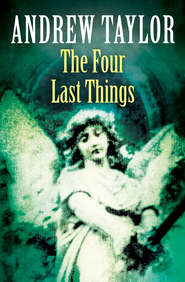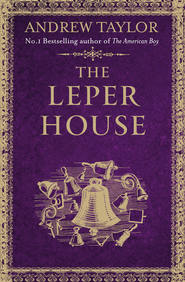По всем вопросам обращайтесь на: info@litportal.ru
(©) 2003-2024.
✖
The Scent of Death
Автор
Год написания книги
2018
Настройки чтения
Размер шрифта
Высота строк
Поля
I was too tired to read. Leaving the bed-curtains tied back, I climbed into bed. I laid myself on top of the bedclothes. The mattress enveloped me. I pinched out the candle.
The darkness was soft and caressing. I found myself thinking of Mrs Arabella. Because the drawing room had been so dimly lit, and because she had not come close to any of the candles, I had not seen her face clearly – it had been no more than a pale smudge floating above her body.
My impression of her derived from information provided by other senses. First, there had been the scent of otto of roses: but the smell of it had combined with the private odours of Mrs Arabella herself to form something richer and denser. Second, I remembered her voice, which had not been like any other I knew. This was partly because she spoke with an American accent, though it was not the broad twang used by so many people I had heard today. Also, of course, she was a woman, with the soft, insinuating tone that certain women possessed.
There had been no women aboard the Earl of Sandwich. To my surprise I felt my naked body responding even to this largely formless memory of Mrs Arabella with a rush of blood that both disconcerted and embarrassed me.
Hastily I directed my attention to my wife, Augusta. I imagined her walking in the park or reading or talking about the clothes and homes of other ladies, as she seemed interminably to do; and by degrees I grew calmer.
In the silence and the darkness, I thought about my daughter. Lizzie had wept when I left her. She was five now, and living with my sister in Shepperton, for her mother had remained in London. I prayed for my daughter’s happiness and for her preservation from all harm, as I did every night.
As I lay there, I became aware that the silence was no longer as absolute as it had been. Somewhere in the distance, a barely distinguishable sound rose and fell in volume in a series of irregular ululations.
The wind in the chimney? A bird of the night? An animal in pain? I did not recognize the sound but that was not strange in itself, for I was in a strange house in a strange city on the coast of a strange continent.
A minute or so slipped by. The sound grew fainter and then stopped altogether.
By that time I was sliding into sleep. My last conscious thought was that the sound might have been a weeping child. But, God be thanked, someone had dried her tears.
Chapter Seven
My Dear Daughter—
I put down the pen and stared out of the window. How did I find the words that would speak directly to a five-year-old child? How could I assure my Lizzie at a distance of three thousand miles of my paternal care and love for her?
After a voyage of five weeks I arrived here without any accident and in as good health as when I left you in Shepperton. The conviction that you will derive more benefit from where you are than if still with me has consoled me greatly on my parting from you.
Dull, I thought – dull, dull, dull. But I must write something to let her know I am safe and that she is in my thoughts. Anything was better than nothing.
Pray give my service to your aunt and ask her to write to me every week to tell me how you all do.
I reminded myself that a father should provide moral guidance to his children. In the rearing of the young, the tender emotions should be, by and large, the province of the tender sex.
If you love me, strive to be good under every situation and to all living creatures, and to acquire those accomplishments which I have put in your power, and which will go far towards ensuring you the warmest love of your affectionate father,
E. Savill
I threw down the pen more violently this time. Ink drops spattered across the table. A moment later, I picked up the pen again, dipped it in the inkpot and wrote in a swift scrawl:
Postscriptum: It feels strange to be on dry land. It does not wobble like the sea. New York is monstrous hot and busy. It is full of our soldiers, and very brave and gay they look in their fine uniforms. I saw many great ships in the harbour. Last night I slept in a featherbed that was as big as an elephant.
I folded the letter, addressed it, and put it to one side, ready to be sealed. It was still early in the morning and the sun was on the other side of the house. I took a fresh sheet and wrote:
My dear Augusta – We are safely arrived in New York, after a passage of some five weeks and two days. The—
I paused again. At this moment, I could think of nothing to write after The. Augusta would not wish to know that the weather was hot or that my mattress was as big as an elephant. Nor perhaps would she wish to hear that I was lodging in a house with a woman who smelled of otto of roses.
As I waited, three drops of ink fell from the pen and blotted the paper. I swore, crumpled up the sheet and tossed it into the empty fireplace. I set down the pen, propped my head on my hands and stared at the view.
The writing table was drawn up to the room’s single window, which looked out on a small garden laid out with bushes and gravelled walks in the old style. To the left was a service yard with a line of outbuildings. On the right, beyond a high wall, was another street, for Judge Wintour’s house stood at an intersection.
At the bottom of the garden, in the angle where the rear wall met the long side wall, was a square pavilion built of red bricks, with the quoins and architraves dressed with stone. Beside it was a narrow gate to the street. The little building was raised above the road. A flight of shallow steps led up to a glazed door on the side facing the house, and there was a tall window on at least two of the other sides. It was some sort of summerhouse, I thought, a species of gazebo or belvedere. Lizzie would love to play house there. I would describe it to her in my next letter.
I took up the pen again.
I have not yet seen much of the house where I am to lodge for I did not arrive here until yesterday evening. It is in Warren Street, not far from King’s College. Judge Wintour was most welcoming and he was gratified to have intelligence of your Uncle Rampton, for whom he entertains the most cordial regard. Pray believe me to be your most devoted servant in all things, ES.
I rang the bell. A young manservant named Abraham, little more than a boy, showed me down to the parlour where the table was set for breakfast. He said that Mrs Wintour rarely rose before midday, and that the Judge and Mrs Arabella were still in their rooms.
While I was eating, there was a double knock on the street door. Abraham returned to say that a gentleman had called to see me.
‘Me? Is it Mr Townley?’
‘No, your honour. A Mr Noak.’
‘Very well. You had better ask him to step in.’
Noak bowed from the doorway. ‘Your servant, sir. I apologize for calling on you so early. I fear necessity has no manners.’
I had a sudden, uncomfortable memory of vomiting over a pewter platter containing Mr Noak’s dinner, not a fortnight ago. ‘My dear sir, in that case necessity is a welcome guest. Pray join me – have you breakfasted?’
Noak perched on the edge of a chair. He said he had already had breakfast but would be glad of a cup of coffee.
‘I know you must be much engaged at present,’ he said. ‘But I did not know whom to turn to.’
I guessed that Noak wanted money. People always wanted money. Townley had been right, when he talked at dinner of Congress’s lack of gold, its fatal weakness: None of us can do without money, eh?
‘—so any form of employment commensurate with my skills and small talents, sir.’
‘What?’ I said. ‘I beg your pardon, I did not quite catch what you said before that.’
‘I said that unfortunately the position I had been invited to fill no longer exists, sir. The gentleman I was to work for has died, and his son has wound up the business. There it is – I have come all this way for nothing, and now I am in want of a situation.’
‘I am sorry to hear it. But I’m not sure what I can do to help – except offer you another cup of coffee.’
Noak shook his head. ‘May I hope for your good offices? You will soon, I’m sure, have an extensive acquaintance here. If you should come across a gentleman who is in want of a clerk – with, I may say, the very highest character from his previous employer in London, as well as considerable experience in the management of affairs both in America and in London – then I beg that you might mention my name.’
‘Nothing would give me greater pleasure,’ I said. ‘But …’
‘I know,’ Noak interrupted. ‘I am clutching at straws, sir. But a man in my position must clutch at something.’
‘Of course.’ I liked the man’s doggedness, his refusal to be cowed. ‘Leave me your direction, sir – I will send you a line if I hear of a place.’
The American took out a pocket book and pencil. ‘A line addressed to the Charing Cross Tavern will always find me.’
A moment later, he pushed back his chair and said abruptly that he would not trouble me any further. It was clear that asking the favour had not come easily to him, and I liked him the better for it.
After I had finished breakfast, I was passing through the hall when I heard another knock at the front door. Abraham opened it. A servant was on the step. I heard him mention my name. Abraham took a letter from him and presented it with a low bow to me. I tore it open.











